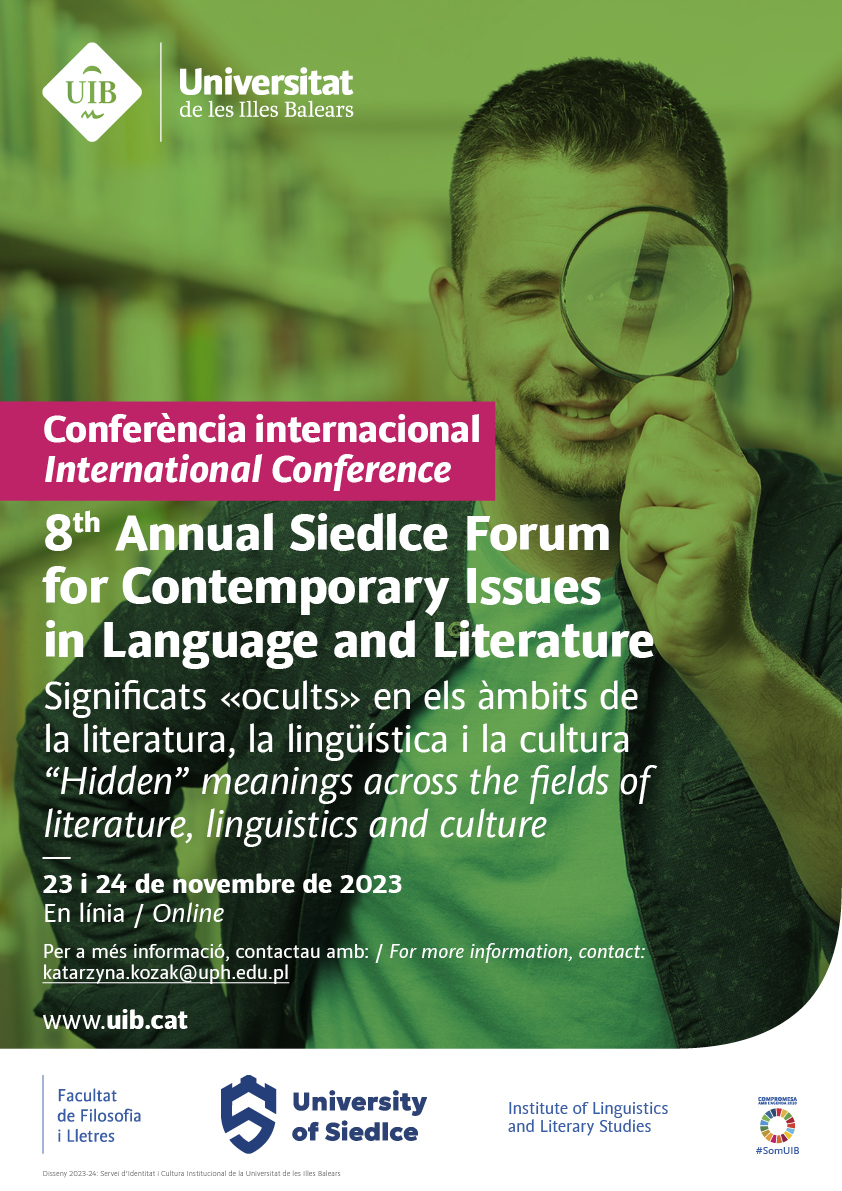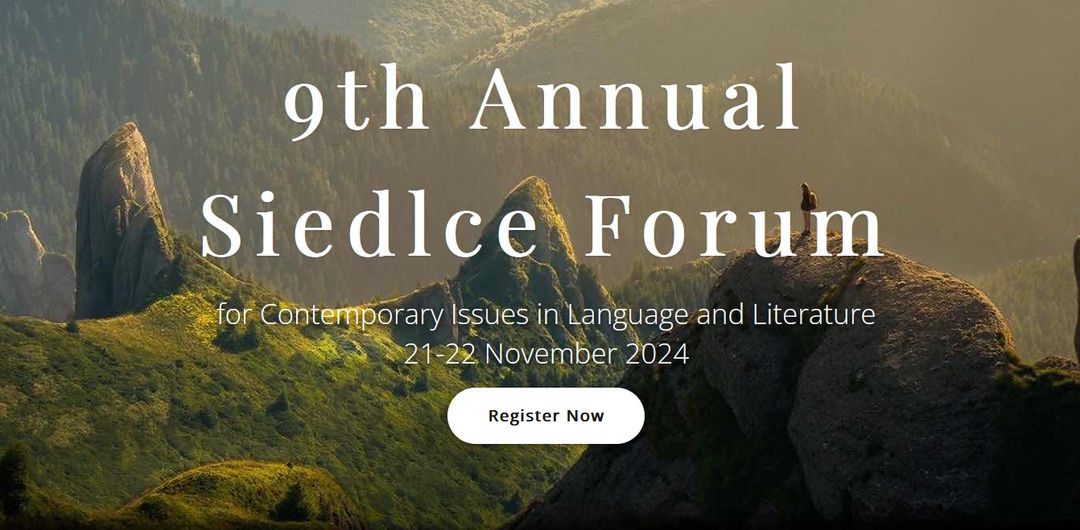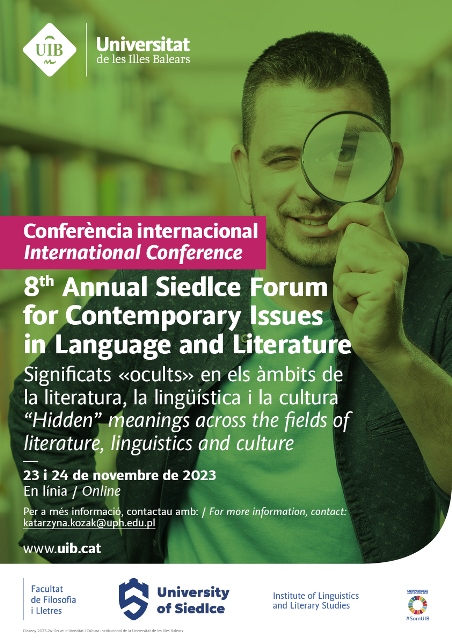Zapraszamy do udziału w konferencji - W tym roku temat przewodni to "Hidden" meanings across the fields of literature, linguistics and culture. Wydarzenie odbędzie się w dniach 23-24 listopada2023 r.
Konferencję organizuje IJiL UwS we współpracy z University of Balearic Islands.
PROGRAM KONFERENCJI. ZAPRASZAMY DO DOŁĄCZENIA - LINKI W PROGRAMIE.
dr Katarzyna Mroczyńska
Call for Papers
University of Siedlce, Institute of Linguistics and Literary Studies and University of the Balearic Islands Faculty of Philosophy and Art
would like to kindly invite all scholars from across the Humanities to take part in the 9th Annual Siedlce Forum for Contemporary Issues in Language and Literature to be held online for the purpose of presenting unpublished research findings in English on November 21st-22nd, 2024. The leitmotif of the conference is: Thresholds of Liminality in Literature, Linguistics, Philosophy and Culture
The conference will be a virtual event. The organizing committee will do their best to ensure that all participants have the IT support they need to access the conference.
Publication. Submitted text proposals will be considered for publication either in the journal Forum for Contemporary Issues in Language and Literature or in a peer-reviewed volume. The texts will need to be submitted by February 15th, 2025 to Ten adres pocztowy jest chroniony przed spamowaniem. Aby go zobaczyć, konieczne jest włączenie w przeglądarce obsługi JavaScript.. Further information concerning publication as well as submission guidelines will be available soon on the conference website.
Organising Committee
Katarzyna Kozak (University of Siedlce)
Edward Colerick (University of Siedlce)
Andrés L. Jaume (UIB)
Charlie Jorge Fernández (UIB)
Katarzyna Mroczyńska (University of Siedlce)
Agnieszka Rzepkowska (University of Siedlce)
Astrid Marie Schwegler Castañer (UIB)
Magdalena Wieczorek (University of Siedlce)
Zapraszamy do udziału w konferencji 8th Annual Siedlce Forum for Contemporary Issues in Language and Literature. W tym roku temat przewodni to "Hidden" meanings across the fields of literature, linguistics and culture. Wydarzenie odbędzie się w dniach 23-24.11.2023.
Konferencję organizuje IJiL UwS we współpracy z University of Balearic Islands.
Annual Siedlce Forum for Contemporary Issues in Language and Literature
The Annual Siedlce Forum for Contemporary Issues in Language and Literature is a conference organized by the Institute of Linguistics and Literature Studies (former Institute of Modern Languages and Interdisciplinary Research) at Siedlce University of Natural Sciences and Humanities since 2015.
The idea of launching an annual conference originated from the reviewed monograph series Forum for Contemporary Issues in Language and Literature started in 2014 with Volume I titled “Novel Approaches in Language, Literature and Culture Studies,” and continued in 2015 with Volume II “From Word to Discourse.” In order to open the series to authors from other research centres and facilitate the exchange of information with them, we decided to start a yearly discussion forum for everyone interested in topics ranging from literature and culture to linguistics.
We hope that our new undertaking will be welcomed by all scholars, who are warmly invited to attend it, share their research findings during a friendly face-to-face discourse and participate in the conference proceedings.
7th Annual Siedlce Forum for Contemporary Issues in Language and Literature
to be held online for the purpose of presenting unpublished research findings
in English on November 24-25th, 2022.
The leitmotif of the conference is:
Representation:between and beyond cyclicity and newnessin literature, language, and philosophy
Representation constitutes a particularly important concern in present-day literary, linguistic, and philosophical discourses. Amitav Ghosh has famously referred to the contemporary situation as ‘a crisis of culture, and thus of the imagination’. In what ways does this crisis affect representation as both a concept and a practice?
One angle on the problem includes genre. In the context of the Anthropocene, traditional genres, including the novel, grow increasingly incapable of dealing with the complexity of the world beyond the human realms of knowledge and existence. As changing apprehensions of space, time, and character become more and more widespread, can literary texts break through their cyclical forms of representation into the newness of multiple temporal and spatial scales, as well as other-than-human forms of narrative?
Another angle on the problem of representation involves the recycling of past receptions of literature for the purpose of present-day critical, political, and social agendas. As the author-work-reader approach gives way to the pressures of post-Barthian readings of canonical texts, does such a move contribute to the crisis of representation? Or does it open up critically new spaces for representation?
The problem of representation equally concerns the ways in which the discourse-functional aspects of linguistic knowledge represent language. In particular, this relates to various forms of symbolic representation (symbols, symbolism, representations of an utterance), the representation of semantic and cultural knowledge in the mind/brain, formal and cognitive models of grammar and grammatical knowledge, meaning construction in discourse, pragmatic and discourse functional aspects of symbolic representation, mental representations (semantic frames, domains, and idealized cognitive models), the relationships between language, culture, and the mind, different forms of representation of utterances in translation, and representation of grammatical and semantic knowledge in dictionaries and other reference works.
In addition, we will be interested in considering how philosophical debates have approached the problem of representation by considering alternatives, such as expressivism and pragmatism. The Philosophy of Language, Epistemology, and the Philosophy of the Mind distance themselves from the rootlessness of representation, insisting instead on the roles of individuals in acting and expressing themselves, on the one hand, and representing their actions in the form of narratives, on the other. Can the form, content, and strategies of narratives hold the key to representation?
Suggested Research Areas
- representation as a problem of narrative and rhetorical language
- the Anthropocene and the problem of representation
- self-representation
- representation as a construction from particular subject positions
- literary theories and representation of the past
- politics of representation
- poetics of representation
- representation as the reflection of a transparent record of reality
- the loss of a referent and the crisis of representation
- the representation of science and technology in children’s literature
- models of representation in translation
- ethics of representation in translation
- theorization and representation in linguistics
- representation in discourse analysis
- text representation: linguistic and cognitive aspects
- lexicographic representations of meaning
The previous conferences:
Annual Siedlce Forum for Contemporary Issues in Language and Literature
-
2023 - "Hidden" meanings across the fields of literature, linguistics and culture, 8th Annual Siedlce Forum for Contemporary Issues in Language and Literature, 23-24/11/2023
-
2022 - Representation: between and beyond cyclicity and newness in literature, language, and philosophy, 7th Annual Siedlce Forum for Contemporary Issues in Language and Literature, 24-25/11/2022
-
2021 - Hybridity in theory and practice: cross-field perspectives, 6th Annual Siedlce Forum for Contemporary Issues in Language and Literature, 25-26/11/2021
-
2020 - Between clarity and fuzziness. Investigating the concept of meaning in linguistic, literary and philosophical contexts, 5th Annual Siedlce Forum for Contemporary Issues in Language and Literature, 27/11/2020
-
2019 - (Un)Intentional Communication across Fields of Culture, Media, Language, and Literature, 4th Forum for Contemporary Issues in Language and Literature, Uniwersytet Przyrodniczo-Humanistyczny, 31/05/2019
-
2018 - Discourse Studies across Fields of Culture, Media, Language, and Literature, 3rd Forum for Contemporary Issues in Language and Literature, Uniwersytet-Przyrodniczo-Humanistyczny w Siedlcach, 20/04/2018
-
2017 - Discourse in Humorousness/Seriousness Dichotomy in Language, Culture and Literature, 2nd Annual Siedlce Forum for Contemporary Issues in Language and Literature, Uniwersytet-Przyrodniczo-Humanistyczny w Siedlcach, 28/04/2017
-
2016 - Uses, Misuses, Abuses of Language in Literature, Culture and Linguistics, 1st Annual Siedlce Forum for Contemporary Issues in Language and Literature, Uniwersytet-Przyrodniczo-Humanistyczny w Siedlcach, 14/10/2016
PATRONAT HONOROWY
DR HAB. TAMARA ZACHARUK, PROF UCZELNI
JM REKTOR UNIWERSYTETU PRZYRODNICZO-HUMANISTYCZNEGO W SIEDLCACH
PROGRAM
VII OGÓLNOPOLSKIEGO SEMINARIUM NAUKOWEGO
z serii Różne odsłony kobiecych światów:
Polki za granicą – cudzoziemki w Polsce:twórczość/działalność kulturalna i naukowa. Historia i współczesność
Miejsce obrad: BIBLIOTEKA GŁÓWNA UPH, S. 225, II PIĘTRO
Ks. J. Popiełuszki 9, SiedlceSiedlce 1 marca 2019
PIĄTEK 1.03.2019
9.30-10.00 REJESTRACJA UCZESTNIKÓW (BG, II piętro, sala 225)
poczęstunek kawowy
10.00 UROCZYSTE OTWARCIE KONFERENCJI
OBRADY PLENARNE
PROWADZENIE:
dr hab. Beata Walęciuk-Dejneka, prof. uczelni
10.15 – 12.30 wystąpienia prelegentów
dr hab. Ryszard Polak, prof. uczelni (Akademia Wychowania Fizycznego Józefa Piłsudskiego w Warszawie. Filia w Białej Podlaskiej) - Emigracja z historycznego i społecznego punktu widzenia w świetle wybranej literatury przedmiotu.
dr hab. Izabela Lis-Wielgosz, prof. uczelni (Uniwersytet im. Adama Mickiewicza w Poznaniu), O emigracji duchowej, czyli wychodźstwie „ze świata” (próba interpretacji fenomenu kobiecej anachorezy).
dr Roman Śliwka (Uniwersytet im. Adama Mickiewicza w Poznaniu), Piękna Polka na czeskim tronie. Historia Elżbiety Ryksy, kobiety z krwi i kości.
dr Ewelina Maria Kostrzewska (Uniwersytet Łódzki), Ziemianki i zakonnice na wspólnych, europejskich szlakach uprawy umysłu przełomu XIX/XX w.
dr Paweł Tarkowski (Akademia Wychowania Fizycznego J. Piłsudskiego w Warszawie/Filia w Białej Podlaskiej), Polki w zawodach medycznych na emigracji w drugiej połowie XIX w. i na początku XX w.
dr Jarosław Pietrzak (Uniwersytet Pedagogiczny w Krakowie), Kulturalne drogi Polek w Italii na przestrzeni XVI-XVIII wieku.
DYSKUSJA
PRZERWA NA KAWĘ I HERBATĘ
PROWADZENIE:
dr hab. Joanna Kuć, prof. uczelni
12.30 – 14.30 wystąpienia prelegentów
dr hab. Anna Gawarecka, prof. uczelni (Uniwersytet im. Adama Mickiewicza w Poznaniu), Swojskość widziana z odległej perspektywy. Powieściowy cykl Evžena Bočka o powrocie arystokratki.
dr hab. Beata Walęciuk-Dejneka, prof. uczelni (Uniwersytet Przyrodniczo-Humanistyczny w Siedlcach), Emigracja intelektualna – Aurelia Wyleżńska w Paryżu.
dr Bogumiła Brogowska (Uniwersytet Gdański), Gabriela Zapolska – polski akcent w paryskim teatrze Antoine’a.
mgr Wioletta Głowa (Akademia Pomorska w Słupsku), Nomadyzm kulturowy. Brukselskie narracje Grażyny Plebanek.
mgr Karolina Kopańska (Uniwersytet Gdański), Wojna i motywy polskie w twórczości Heleny Janeczek.
DYSKUSJA
PRZERWA NA OBIAD
PROWADZENIE:
dr hab. Beata Walęciuk-Dejneka, prof. uczelni
16.00 – 17.30 wystąpienia prelegentów
dr hab. Katarzyna Szmigiero (Uniwersytet Jana Kochanowskiego w Kielcach, Filia w Piotrkowie Trybunalskim), Helena Rubinstein – kobieta, która zdefiniowała piękno i stworzyła postawy współczesnej kosmetologii.
dr Katarzyna Kułakowska (Instytut Sztuki PAN), Erdmute Sobaszek, Prusaczka z Krainy Rachmanów. Rzecz o współzałożycielce i aktorce Teatru Wiejskiego Węgajty.
mgr Ewelina Anna Warumzer (Uniwersytet Jagielloński), Od migracji ze wsi do miasta do przekroczenia ,,żelaznej kurtyny”. Historia Zuli Lichoń z filmu ,,Zimna wojna”.
mgr Matylda Zatorska (Uniwersytet Rzeszowski), Boginie tańca. Beletryzowane biografie polskich tancerek.
DYSKUSJA, PRZERWA NA KAWĘ I HERBATĘ,
ZAMKNIĘCIE KONFERENCJI
Information about the Annual Siedlce Forum for Contemporary Issues in Language and Literature are available at the Conference's website
https://annualsiedlceforum.uws.edu.pl/
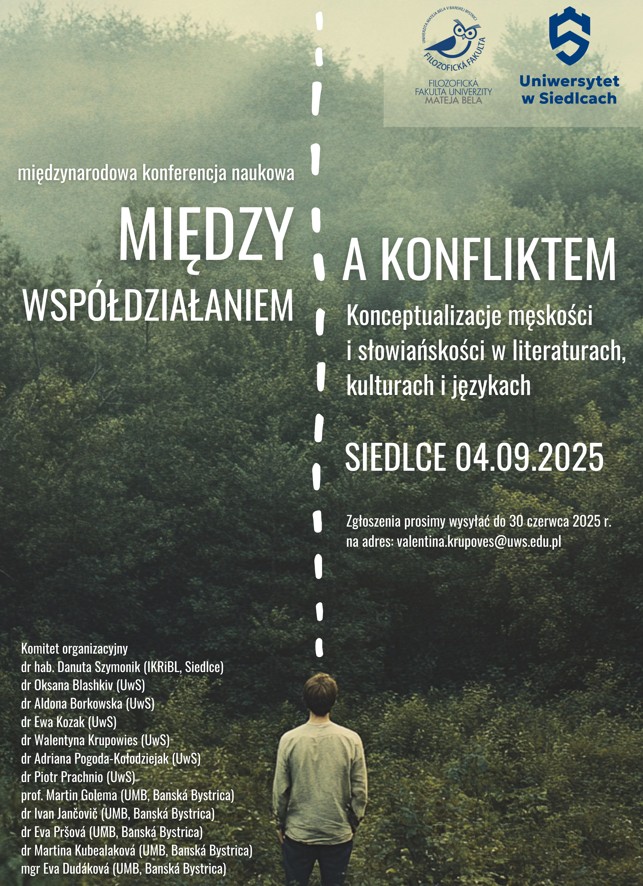
Między współdziałaniem a konfliktem. Konceptualizacje męskości i słowiańskości w literaturach, kulturach i językach - infromacje
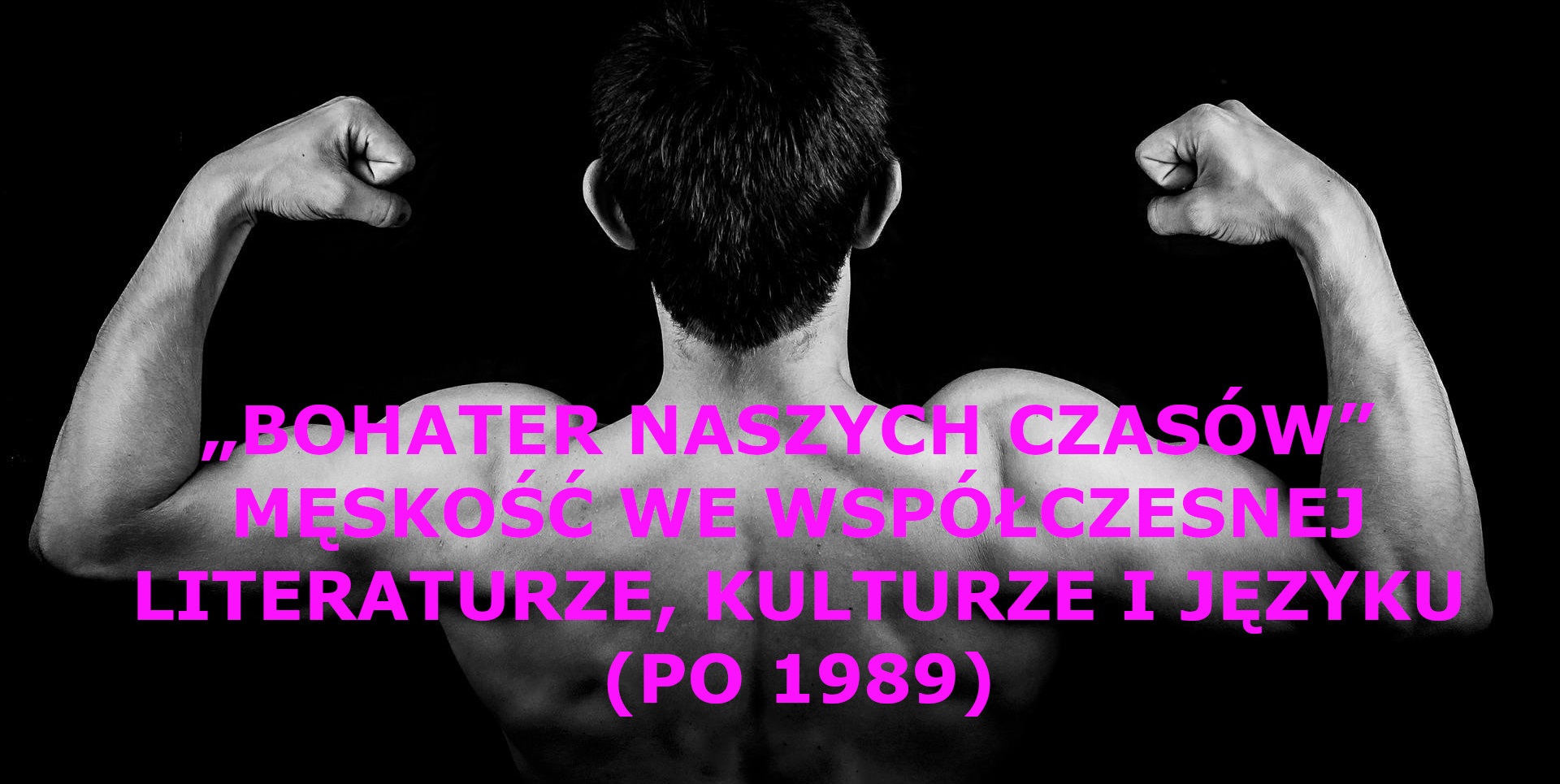
Instytut Językoznawstwa i Literaturoznawstwa
Uniwersytetu Przyrodniczo-Humanistycznego w Siedlcach,
Instytut Germanistyki Uniwersytetu Warszawskiego
oraz
Wydział Filozoficzny
Uniwersytetu Mateja Bela w Bańskiej Bystrzycy
zapraszają do uczestnictwa w Międzynarodowej Konferencji Naukowej
na temat:
„BOHATER NASZYCH CZASÓW”:
MĘSKOŚĆ WE WSPÓŁCZESNEJ LITERATURZE, KULTURZE I JĘZYKU (PO 1989)
która odbędzie się 8-9 września 2022 roku w Siedlcach
Proponowane seminarium naukowe jest kontynuacją zapoczątkowanych w naszym Instytucie rozważań nad figurami mężczyzn i ewolucją męskości w literaturze, kulturze i języku. Obecnie chcemy się skoncentrować na współczesnych wariantach męskości i poszukać m. in. odpowiedzi na pytanie, czy tradycyjne patriarchalne wzorce męskości funkcjonują jeszcze w dzisiejszej literaturze i języku, czy też mamy do czynienia z zupełnie nowym, odmiennym od hegemonicznego, modelem męskości w kulturze naszych czasów?
Refleksji naukowej chcemy poddać następujące kwestie:
- Studia nad męskością w literaturoznawstwie, językoznawstwie oraz kulturoznawstwie polskim i światowym,
- Sposoby opisu męskości we współczesnej literaturze, kulturze i języku
- Mężczyzna we współczesnej rodzinie,
- Stereotypowe rozumienie męskości – prawda czy fałsz?
- Formy i rodzaje męskości: problem wzorca modelowego,
- Próby rekonstrukcji męskości we współczesnych tekstach kultury,
- Problem formowania się męskości: chłopięcość jako poszukiwanie własnej tożsamości,
- Kwestia męskości w wymiarze etycznym,
- Narodowe modele męskości,
- Wizerunki mężczyzn utrwalone w różnych tekstach kultury,
- „Męskość militarna”.
Będziemy wdzięczni także za wystąpienia prezentujące inne aspekty proponowanej tematyki.
Język konferencji – języki słowiańskie, angielski, niemiecki.
Komitet organizacyjny:
prof. dr hab. Martin Golema (UMB, Bańska Bystrzyca) | prof. dr hab. Katarzyna Grzywka-Kolago (Uniwersytet Warszawski) | dr hab. Sławomir Sobieraj, prof. uczelni (UPH w Siedlcach) | dr hab. Roman Bobryk, prof. uczelni (UPH w Siedlcach) | dr hab. Anna Górajek, prof. uczelni (Uniwersytet Warszawski) | dr hab. Danuta Szymonik (IKRiBL, Siedlce) | dr Edward Colerick, prof. uczelni (UPH w Siedlcach) | dr Aldona Borkowska (UPH w Siedlcach) | dr Ewa Kozak (UPH w Siedlcach) | dr Katarzyna Kozak (UPH w Siedlcach) | dr Walentyna Krupowies (UPH w Siedlcach) | dr Adriana Pogoda-Kołodziejak (UPH w Siedlcach)
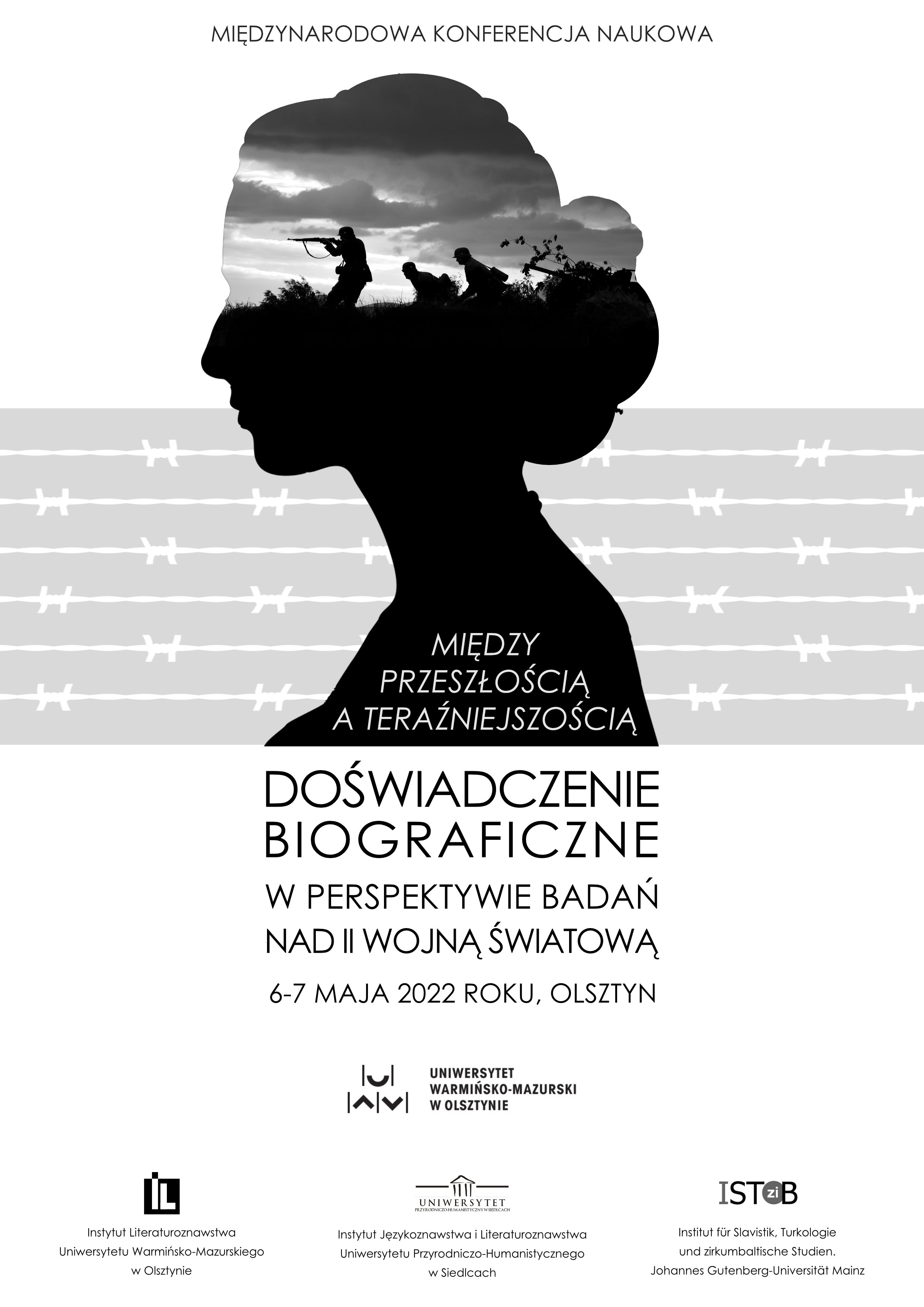
Formularz zgłoszeniowy: POBIERZ
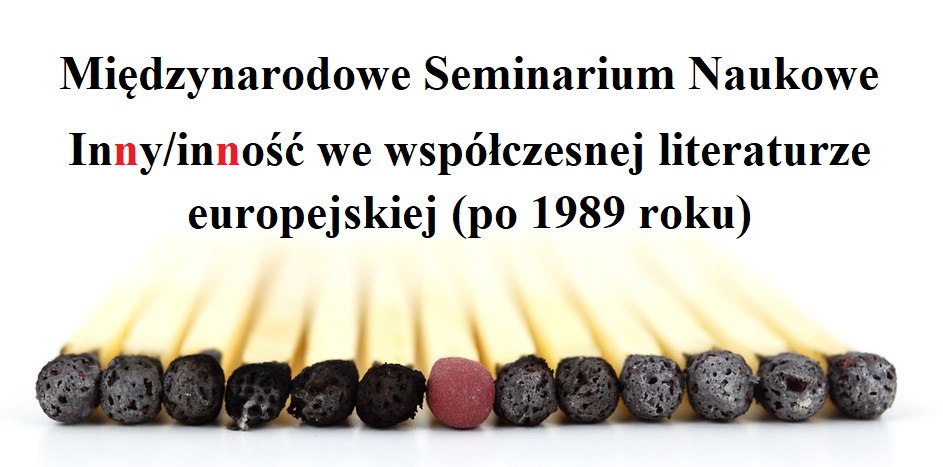
Formularz zgłoszeniowy

Szanowni Państwo,
zapraszamy do uczestnictwa w międzynarodowym seminarium naukowym nt.
Inny/inność we współczesnej literaturze europejskiej (po 1989 roku)
Rozpoznanie stanu współczesnego świata jako świata w kryzysie (pandemia, izolacja, niepewność przyszłości) pozwala podjąć na nowo zagadnienie inności i jej wielopostaciowej obecności w literaturze współczesnej.
Problematykę Innego/inności chcemy roztrząsać na gruncie literatury europejskiej po 1989 roku, który to rok był punktem zwrotnym w dziejach współczesnej Europy.
Proponujemy refleksję nad następującymi zagadnieniami szczegółowymi:
- Inny/inność we współczesnej literaturze europejskiej: dociekania dyskursu literaturoznawczego.
- Poznanie Innego/dialog z Innym (Drugim, Obcym) jako składowa autorefleksji nad tożsamością w rozmaitych kontekstach: kulturowym, zawodowym, genderowym, religijnym, etnicznym, regionalnym.
- Inność uobecniająca się w utworze literackim jako wypadkowa wielorakich wpływów i wyborów dokonywanych przez autora – narratora – postacie.
- Inność w rozmaitych kontekstach i sytuacjach (wielokulturowości regionu/miasta, obcości regionu/miasta, nowego regionu/miasta).
- Inny/inność w literaturze: problem granicy między swojskością a obcością oraz możliwości jej przekroczenia.
- Inność w kontekście badań posthumanistycznych.
Seminarium odbędzie się 22 października 2021 roku online.
Języki obrad: wszystkie słowiańskie i angielski.
Zgłoszenia uczestnictwa w seminarium prosimy wysyłać do 25 września 2021 r. na adres: Ten adres pocztowy jest chroniony przed spamowaniem. Aby go zobaczyć, konieczne jest włączenie w przeglądarce obsługi JavaScript.
Opłata konferencyjna wynosi 30 EUR/150 zł i obejmuje koszty przygotowania do druku i publikacji.
Wpłaty przyjmujemy do 10 października 2021 roku na konto:
Bank Pekao S.A. I O. w Siedlcach
ul. Wojskowa 24
08-110 Siedlce
Numer IBAN: PL19 1240 2685 1111 0000 3656 3195
Kod SWIFT (kod BIC): PKOPPLPW
z dopiskiem Inność seminarium.
W imieniu organizatorów:
Ludmiła Mnich (przewodnicząca)
Oksana Blashkiv (sekretarz)




